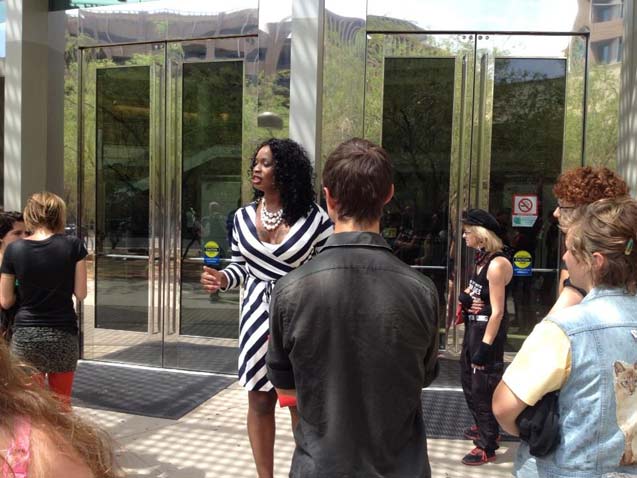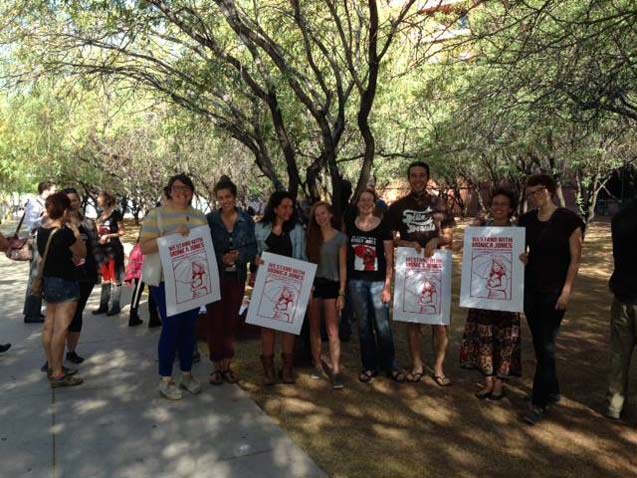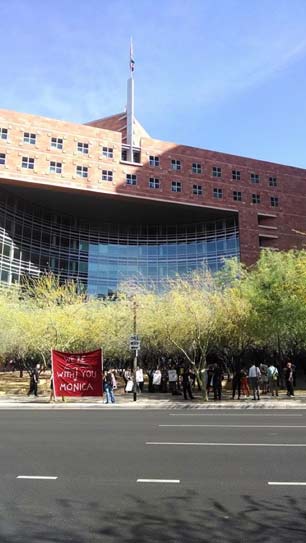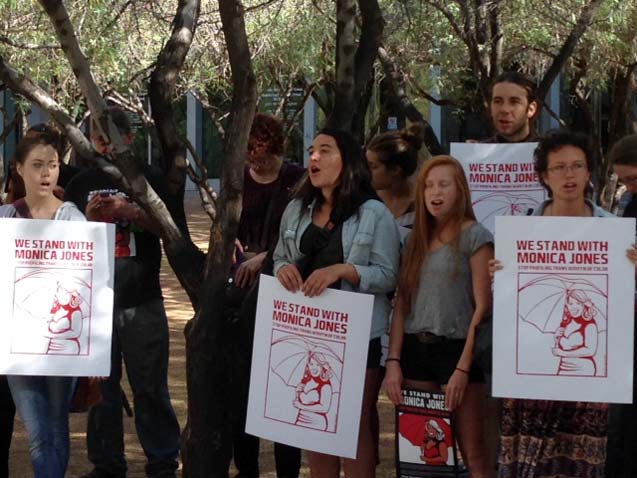
On Friday, April 11, I went down to Phoenix with over a dozen students and professors from Prescott College to stand with Monica Jones at her trial. She was charged with manifesting prostitution, picked up in a sting orchestrated by Project Rose, a project of Arizona State University’s School of Social Work, and the Phoenix Police Department. One of the tragedies of the situation is that Monica is a student at Arizona State University, studying social work. She was arrested the day after attending a protest of Project Rose last year, and many believe she was targeted for voicing her opposition.
We joined more than 30 activists affiliated with the Sex Workers Outreach Project (SWOP) Phoenix Chapter, who had organized a press conference before the trial. The multigenerational group chanted that the criminalization of sex work and Project Rose has got to go as we marched into the courthouse. One blessing of living in the belly of the beast is that it’s clear that all of our struggles are interrelated.
 Monica Jones speaking outside the courthouse after the trial. (Photo: Laura Campagna)
Monica Jones speaking outside the courthouse after the trial. (Photo: Laura Campagna)
Carlos Garcia from Puente Human Rights Movement, who organizes against the criminalization and deportation of the undocumented community in Phoenix, was at the press conference. He recently participated in the Trail to End Deportation, which was a three-day, 60-mile march from Phoenix to Eloy Detention Center. Many members of Puente are in Washington right now, joining immigrant rights activists from across the country on a hunger strike in front of the White House to urge President Obama, the Deporter in Chief, to halt the deportations of immigrants and allow families to be reunited. #not1more, #2million2many, #ni1mas.
Monica’s case is occurring within a larger context of criminalizing queer and gender-variant people in Arizona. In February, the Arizona legislature passed SB 1062, a bill that would have allowed employees and businesses to refuse service to LGBT people on religious grounds. Arizona is famous for passing laws that mandate subjective profiling based on appearance, such as SB1070, which begged the question: what does an immigrant look like? After the bill’s passage, Governor Jan Brewer admitted that she was unable to articulate what exactly an immigrant looked like, but was confident that members of her law enforcement agencies would be able to identify them on sight. Similarly, SB 1062 asked, what does an LGBT person look like? It made all of us queer people in Arizona wonder if we looked “gay.” It made me consider growing out my hair again because at its heart, SB 1062 was about policing gender under the guise of sexuality.
 Prescott College students and Laura Campagna at the Press Conference before the trial. (Photo: Professor Zoe Hammer)
Prescott College students and Laura Campagna at the Press Conference before the trial. (Photo: Professor Zoe Hammer)
Any teenager knows that people who look gay are those who are not doing gender “correctly” or convincingly. Laws that promote discrimination against those perceived to be LGBT facilitate the policing of gender non-conforming behavior and violence against the transgender community. Many studies have found that transgender women of color are disproportionately targeted for hate violence. SB 1062 and its ilk (copycat bills were introduced in Missouri, Georgia and Kansas shortly thereafter) put vulnerable communities at greater risk. Ultimately, Brewer vetoed the bill, but not because she is a friend to the gays – the Super Bowl was on the line. The NFL was monitoring the situation and thankfully had a stronger anti-discrimination policy than the state of Arizona, which was competing to host the Super Bowl in 2015.
 A view of the press conference in front of the Phoenix Municipal Courthouse before the trial. (Photo: Peggy Plews) Inside the small courtroom, jam-packed with so many supporters that people had to find seats on the floor or each other’s laps, we heard testimony from the undercover police officer and Monica. There were many inconsistencies between the stories.
A view of the press conference in front of the Phoenix Municipal Courthouse before the trial. (Photo: Peggy Plews) Inside the small courtroom, jam-packed with so many supporters that people had to find seats on the floor or each other’s laps, we heard testimony from the undercover police officer and Monica. There were many inconsistencies between the stories.
The defense attorney reminded the judge that since it was a bench hearing, and he was both judge and jury, the officer’s word should not be given greater credence than Monica’s. The judge agreed that was an important point, but then sided with the officer whose logic boiled down to this: She looked like a prostitute.
Although it was a Friday night and Monica (who does not drive) was walking from her apartment to a neighborhood bar as she often does on weekend evenings, there could be no other explanation for her being on the street than the intent to manifest prostitution. The officer admitted that he spotted Monica from his car and targeted her. He did not have to say it was for the way she looked: there could be no other explanation.
Monica Jones was profiled for looking like a sex worker in a state where law enforcement has been granted the power to determine who people are based on their appearance. And the court reaffirmed that perception. The judge believed the officer’s story over hers not because his made more sense (it didn’t), but because she is an African-American transgender woman. Her identity has already been criminalized.
The judge gave Monica the minimum mandatory sentence of 30 days and charged her with hundreds of dollars in fines. Acknowledging that she is a student, he is allowing her to finish out her classes before fulfilling her sentence. He may have intended to seem compassionate, though his decision is anything but when one considers the violence that Monica may face in prison, since rates of abuse against transgender women who are housed in men’s prisons are horrific.
Monica left the courtroom with her head held high, and once outside the courthouse doors announced her intent to appeal. The constitutionality of the “manifesting prostitution” statute has been challenged by an amicus brief submitted by the ACLU.
 Prescott College students chanting at the Press Conference. (Photo: Professor Zoe Hammer)
Prescott College students chanting at the Press Conference. (Photo: Professor Zoe Hammer)
There is hope for the case, but in the meantime, Monica needs to raise a considerable amount of money for legal fees. In addition to finishing up the semester, she also has to work with her attorney on the appeal. The community will continue to rally around her locally and nationally. There have been solidarity protests in cities all over the country, such as the one in Washington, D.C., where protestors rallied to repeal prostitution-free zones in their city.
The fact that the university where Monica is seeking a degree in counseling had a hand in creating this situation that greatly undermines her ability to focus on her education is inexcusable. But part of this work for justice includes immediately ending programs like Project Rose and the lengthier task of decriminalizing sex work and dismantling the prison industrial complex.
There are many fronts on which we struggle here because we know that what happens in Arizona spreads to other states. The great part is that we are all in it together because my liberation is bound up with yours. All of us or none.
Our most important fundraising appeal of the year
December is the most critical time of year for Truthout, because our nonprofit news is funded almost entirely by individual donations from readers like you. So before you navigate away, we ask that you take just a second to support Truthout with a tax-deductible donation.
This year is a little different. We are up against a far-reaching, wide-scale attack on press freedom coming from the Trump administration. 2025 was a year of frightening censorship, news industry corporate consolidation, and worsening financial conditions for progressive nonprofits across the board.
We can only resist Trump’s agenda by cultivating a strong base of support. The right-wing mediasphere is funded comfortably by billionaire owners and venture capitalist philanthropists. At Truthout, we have you.
We’ve set an ambitious target for our year-end campaign — a goal of $250,000 to keep up our fight against authoritarianism in 2026. Please take a meaningful action in this fight: make a one-time or monthly donation to Truthout before December 31. If you have the means, please dig deep.